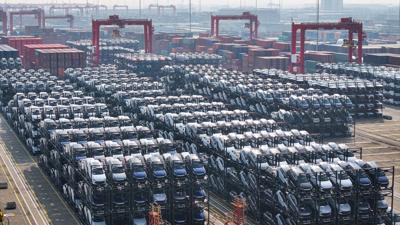As the federal government reviews Canada’s 100 per cent tariff on Chinese electric vehicles, industry insiders warn that ditching it entirely would be “an existential threat” to the Canadian automotive industry.
The tariff, which came into place almost a year ago, faces an automatic review, with results due by Oct. 1. Getting rid of it would prompt harsh retaliation from the U.S., and be the death knell for automotive production here, said the head of the association representing Detroit’s Big Three automakers in Canada.
“There is simply no option but to maintain that tariff,” said Brian Kingston, CEO of the Canadian Vehicle Manufacturers’ Association. “Getting rid of it would be an existential threat to the industry and all you need to do is look at other countries that have been asleep at the switch on this one.”
The review comes as the federal government attempts to broaden Canada’s trade relationship with China amidst a trade war sparked by tariffs from U.S. President Donald Trump. In the wake of Canada’s EV tariff, China retaliated with a 100 per cent levy on Canadian canola.
Kingston pointed to sales figures that show a rapid growth in sales of Chinese-produced cars in other countries, including Mexico. In 2020, Kingston said, just four per cent of cars sold in Mexico were produced in China. Now, roughly a third of new cars sold in Mexico are made in China.
“That’s what happens if you open the door and we simply cannot take that risk,” said Kingston.
On Wednesday, Mexico announced it was raising tariffs on cars imported from China to 50 per cent from 20 per cent.
The head of Canada’s Automotive Parts Manufacturers Association (APMA) said letting cheaper Chinese EVs such as BYD or XPeng into Canada would hammer sales of North American, European and Japanese cars here, and also potentially kill off a promising Canadian EV industry.
“We know about the Chinese when they enter the market,” said APMA CEO Flavio Volpe. “They eat up market share resulting in lower volumes for market-driven players. And lower volumes mean fewer cars which means fewer jobs. The only question is the rate at which they gobble up the market share.”
And the Chinese auto manufacturers are anything but market driven, Volpe argued, saying the Chinese cars are being sold well below their manufacturing cost.
“When they’re going to sell you a $13,000 vehicle, do you think it costs $13,000 to make it or do you think it costs $20,000 to make it?” said Volpe. “There’s Chinese oversupply and they’re dumping product around the world.”
Volpe added that Chinese automakers don’t source any of their materials or parts in Canada.
“There isn’t anybody who’s in raw materials, parts, sales and after-service or assembly who thinks it’s a good idea to give away the market to centrally planned, overly subsidized competitors,” said Volpe.
The head of the trade association representing steel makers in Canada said anything which hurts auto manufacturing in North America also hurts the Canadian steel industry.
“The North American auto sector has always been a significant customer of the Canadian steel industry,” said Catherine Cobden, CEO of the Canadian Steel Producers Association.┬Ā
Changing or dropping the tariffs on Chinese EVs┬ĀŌĆö and on Chinese steel┬ĀŌĆö would be a mistake, Cobden said.
“It would be a backwards step, given that there was a strong rationale to put them in place a year ago. And frankly, nothing has changed since then,ŌĆØ Cobden said.
Also Wednesday, a federal government official called the review of the tariffs “routine,” and said the government would protect Canadian jobs and the manufacturing sector.
ŌĆ£The government committed to review these surtaxes within one year. This is a routine assessment, as with any surtax or regulatory measure, to ensure policies remain appropriate. Canada will always defend Canadian workers, support our manufacturing sector, and strengthen our trade relationships,” the official said.
Tuesday, federal Agriculture Minister Heath MacDonald said that reducing the tariff on Chinese EVs is “certainly something that we’re looking at” but cautioned that other trade concerns are being kept in mind. MacDonald didn’t specifically mention the U.S., which is also a big importer of Canadian canola and was the first to slap a tariff on Chinese EVs.
“Every decision that we make as a federal government, we want to ensure that we’re not jeopardizing a situation that could be ever broader,” MacDonald told reporters at the end of a meeting with his provincial and territorial counterparts.
The APMA’s Volpe suggested that the Chinese government deliberately targeted the canola industry as a way of putting a wedge between Canadian regions, pitting the Saskatchewan-based industry against the Ontario-dominated auto sector.
“China has been trying to stick a wedge between us, and they’ve found where to put the wedge,” said Volpe.
The head of CanadaŌĆÖs largest private sector union said getting rid of the tariff on Chinese electric vehicles would hurt Canadian workers and the economy.
ŌĆ£Removing the tariff guardrails that are keeping unfair Chinese EV imports from flooding our home market would be the worst thing our government can do,ŌĆØ said Unifor national president Lana Payne. ŌĆ£Canada cannot become a dumping ground for Chinese vehicles. Rather, we need Prime Minister Carney to incentivize the sale of Canadian-built EVs, protect supply chain investments, and build the clean car infrastructure Canada needs.ŌĆØ
With files from Star wire services



























To join the conversation set a first and last name in your user profile.
Sign in or register for free to join the Conversation